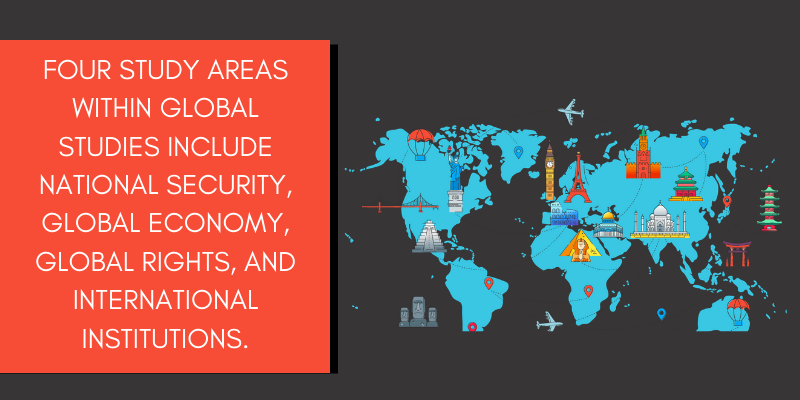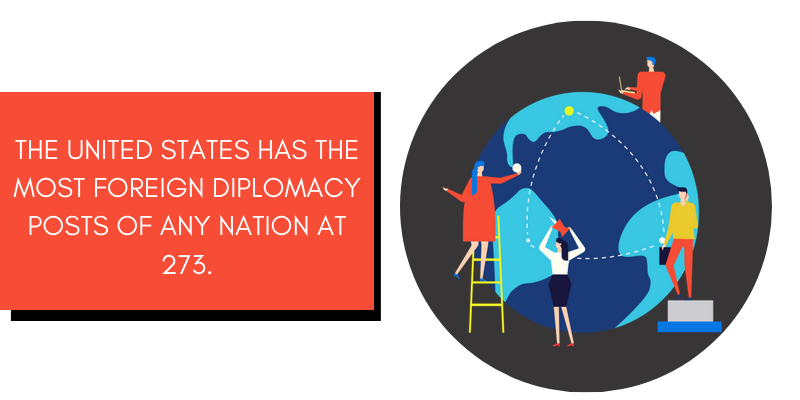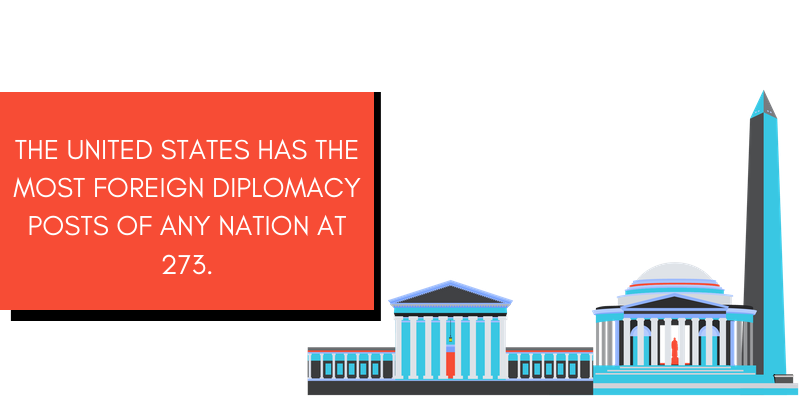 Let us guess. You’re moved by stories of international cooperation. And you’re bothered — or even spurred to action — by stories about how global trends harm remote corners of the world. You already know that today’s world is interconnected in almost every way, technologically, by industry, by our food chains, by our cultures, and environmentally. You want the chance to study and potentially work at the intersection of cultures, economies, and people groups. Well, you may just be a great fit for a degree in global studies!
Let us guess. You’re moved by stories of international cooperation. And you’re bothered — or even spurred to action — by stories about how global trends harm remote corners of the world. You already know that today’s world is interconnected in almost every way, technologically, by industry, by our food chains, by our cultures, and environmentally. You want the chance to study and potentially work at the intersection of cultures, economies, and people groups. Well, you may just be a great fit for a degree in global studies!
Global studies is an interdisciplinary degree that primarily focuses on the following elements within the context of global or widespread people group issues:
- Political Issues
- Economics Issues
- Social Issues
Global studies is differentiated from the similar academic study of international studies through a slightly different focus.
International studies is primarily concerned with state actors and their interactions on behalf of their nations. Meanwhile global studies focuses on individuals, small people groups, and regions that may be affected by global or extranational developments.
An additional way to differentiate between international and global studies fields is that global studies has tended to develop an appeal from individuals and entities representing the “left” of the American political system. Meanwhile, international studies with its focus on traditional geopolitics and interstate diplomacy has developed an appeal from the “right” of the American political system.

Interested in learning more? Here at DegreeQuery we’ve covered a wide range of degree types. And in our dealings with future students have learned to answer the questions that matter the most to those seeking a degree. In this guide we’ll take a look at the following questions.
In This Guide:
- WhatGlobal Studies Degrees Are Available?
- Can I Gain a Global Studies Degree Online?
- How Do I Gain Admission to a Global Studies Degree Program?
- What Can I Do With a Degree in Global Studies?
Don’t see what you’re looking for? Be sure to look through our related content below:
- What Can I Do With a Russian & East European Languages Degree?
- What Can I Do With a Political Science Degree?
- What Can I Do With a Middle Eastern & African Studies Degree?
- What does a developmental psychologist do?
- What Can I Do With an Italian Degree?
- What Can I Do with a Degree in German?
- What Can I Do with a Degree in Spanish?
- What Can I Do With a Social Policy Degree?
- What Bachelor’s Degree do People have who work in Public Health?
- What is a Degree in National Security Studies?
- What Can I Do With a French Degree?
- What Can I Do With a Sociology Degree?
- What Classes are there in an Emergency Management Bachelor’s Degree?
- What Industries Hire Graduates with a Degree in Graphic Design?
- What is a Bachelor’s Degree in Sustainability?
- How fast can I earn a Master’s Degree in Environmental Science?
- What is a Bachelor’s Degree in Environmental Engineering?
What Global Studies Degrees Are Available?
Global studies are interdisciplinary degrees that are primarily available at the bachelor’s, master’s, and doctoral levels. As global studies draws on a number of other disciplines, students may also elect to pursue a focus within one of these other disciplines that is closely aligned with a global studies degree program.

While students may be able to take some of the prerequisite work for a global studies degree at the associates level, there typically are not full degrees of this type within community colleges or associates programs.
Bachelor’s in global studies focus on providing a wide base of general education courses meant to support you in critical thinking and communication. Major courses focus on exposing students to a wide range of topics related to global issues including politics, economics, history, and law. In addition, most programs allow students to “specialize” to some degree in one of these sub-disciplines within global studies.
Within general education courses in a global studies majors, students are likely to take most of the following (or related) courses:
- English Literature and Composition
- Ethics, Philosophy, or Comparative Religion
- Social Science Courses (psychology, economics, sociology, etc.)
- Natural Science Courses (Chemistry, Biology, Physics, etc.)
- Data Literacy and Computing
- Physical Education
- Among Others
Within major courses, students will most likely take courses from a range of departments, and may be able to specialize in their field of study to some degree by selecting more electives within a given department.
The most common major courses offered in a bachelor’s in global studies degree include the following:
- Economics
- Geography
- Sociology
- Political Science
- Planning and Development
- Law
- History
- Anthropology
Additionally, some academic programs at the bachelor’s level will allow students to gain additional experience through internships (for credit or paid), the writing of an undergraduate thesis, or undergraduate concentrations.
The most common concentration areas within undergraduate degrees in global studies include:
- World Culture
- Justice and Human Rights
- Building/Built Environments
- Global Health
- Ecology/Climate Change
- Cities Around the World/Urbanization
- Among Others
While no one program will offer all of the options noted above, you should be able to find an in-person or online option that offers a program addressing a great range of what you hope to study at the bachelor’s level in a global studies degree.

Master’s in global studies are often the de facto starting point for a career in global studies, whether that be in a research capacity, working in diplomacy, working for a large multinational organization, or educating others about global studies.
Master’s degrees in this field may be obtained in one of two ways. Some students may apply directly to master’s programs upon completing their undergraduate study. These programs are known as terminal master’s, and do not automatically lead to a doctoral degree afterwards.
Alternatively students may enroll directly into a doctoral program out of their undergraduate years of study. In this case students who successfully work through their coursework for the initial few years of a doctoral degree are awarded a master’s degree “en route” to a doctorate.
Whichever option you choose to pursue, master’s in global studies typically require 2-3 years for completion. Students in master’s programs are typically exposed to a range of topical clusters of study at the graduate level. Furthermore, students often choose a concentration within master’s programs. Typically concentrations offered within master’s in global studies include:
- The Global Economy
- Global Societies, Institutions, and Politics
- Labor Rights
- Human Rights
- International War Crimes
- Climate Change and Ecology
- International Development
- And Concentrations Focused on Individual Regions of the World
Students will typically work on the creation of a master’s-level thesis on a topic that aligns with their concentration area. Master’s theses are 100+ page documents that summarize current research within a sub-field of a discipline and arrange findings into an argument. These documents aren’t original research, but are meant to show mastery of the skills involved with engaging with the best thinkers within a field at a high level.
At the doctoral level the primary degree type available within global studies is that a doctor of philosophy (Ph.D.) in global studies. Ph.D. programs are doctorates centered around research. This doesn’t mean that you need to work in research roles when you obtain a Ph.D., but rather that two of the primary focus areas within Ph.D.’s are to prepare the next generation of educators in a discipline, and to support students in the creation of original research in the form of a dissertation.
Unlike master’s theses, dissertations are several hundred pages of original research. To be accepted, they should — in theory — be of a high enough quality to be accepted by a peer reviewed publication. Dissertations don’t have to actually be published, but they should be of quality that they could be. Upon successfully “defending” a dissertation in front of a panel of peers as well as completing a comprehensive exam, students are granted a doctorate within a discipline.

While many of the most common areas of focus at the doctoral level are similar to those offered at the master’s level, students may focus on any subdiscipline within global studies for their doctoral work. When students have graduated they should be a true “expert” on a given area within global studies and be able to back this claim up with hundreds of pages worth of original research.
Can I Gain a Global Studies Degree Online?
As with many other types of degrees, global studies degrees are in many cases offered 100% online. While doctoral research may involve visiting the regions you’re focusing on (or repositories of knowledge about these regions), bachelor’s and master’s degrees in global studies are commonly offered online.
While millions of students have succeeded in online learning environments, and online learning is an enabler of continued education, students who have not taken online courses before should be sure to consider some of the pros and cons of online education before “jumping in.”
Some of the most common “selling points” of online education include lower fees, access to world class faculty from wherever you are, and the ability to structure your study around busy work or life obligations.
On the flip side, some students do find that online learning just isn’t for them. Some of the most common “cons” of online education include the fact that some students have a harder time meeting professors or classmates online, students often have less access to support services or networking events, and the need to be more of a self starter student within online settings.
How Do I Gain Admission to a Global Studies Degree Program?
Global studies degree programs hold admissions standards similar to other social science degrees of the same level.
At the bachelor’s level, students should expect to need to supply standardized test scores, a high school transcript (or equivalent), a resume (if applicable), applications essays, and letters of recommendation. Students pursuing a degree at this level typically apply to to the undergraduate college within a university (or the more general college if entering an undergraduate-only school) and then request to join the global studies major.

At the master’s level, students may find two primary ways to enter into a degree program. Some programs are built for working adults, and these programs may often allow students to share work experience, resumes, and recommendations as an alternative to other admissions materials. With that said, the most common route to entry in a master’s in global studies degree program is through taking a GRE standardized test, obtaining your undergraduate transcript, and submitting a statement of purpose, letters of recommendation, and a resume.
At the doctoral level, admissions standards are often similar to that of master’s level programs, yet slightly more rigorous. Students who have not taken a great deal of coursework within global studies should expect many programs to require you to take some prerequisites before potentially granting you admissions. Additionally, students should reach out to faculty within the program to see if they are willing to act as advisors during the dissertation process. Ensure professors you reach out to perform research in an area in which you are interested in first.
What Can I Do With a Degree in Global Studies?
If you’ve taken any courses in global studies, you should know that the interdisciplinary (and global) nature of a global studies degrees makes its applications nearly limitless.
Couple a global studies degree with a foreign language and work in business, non-profits, or international aid abroad. Work as a domestic expert on a certain region of the world within a journalistic, research, governmental, or business context. Or continue researching and work in education.
Global studies degrees are also unique in that they can prepare you to work at many levels within non-governmental organizations (NGOs) or for governmental agencies.

With that said, some of the most common roles one may work in with a global studies degree include:
- Civil Service Worker
- Humanitarian Aid Worker
- International Relations Specialist
- Human Relations Specialist for a Global Company
- Or as an Educator/Researcher
Working our way down the list, civil service workers work within governmental agencies to implement official policy. Additionally, similar roles exist within international bodies such as the United Nations, NATO, and others. While you’ll likely need to couple your global studies degree with an additional skillset to move up the ladder, civil servants commonly work with other nations or people groups.
Some of the roles that follow most closely from a global studies degree include that of a customs specialist, a policy officer, or a researcher within a governmental organization that creates international policy. All three roles listed above would require an understanding of one region in the world as well as a basic framework through which to understand international law and how your nation’s laws interact with other’s abroad. While salaries vary depending on role and seniority level, civil service workers can commonly make upwards of $70,000 a year at the later stages of their career.

Humanitarian aid workers are at their largest concentrations working for large international bodies such as the United Nations or the Red Cross While one may aspire to move up the ranks within an international organization over time, starting as a humanitarian aid worker can help to provide you with first hand experience of conditions “on the ground” somewhere in the world. Knowledge of a local language, regional politics, or the dynamics that created a situation in which aid is needed are particularly valuable for humanitarian aid workers. While most humanitarian aid work positions are more “passion projects” than jobs you may hold for a career, they’re a great way to get to the “front lines” of complex geopolitical and regional crises.
International relations specialists work for a wide range of multinational-facing organizations including large businesses, non-profits, international organizations, and governments. These specialists are the thought leaders for when organizations need to interface with a society, people group, or region other than their own. Many of these roles will work to establish policy, contacts, and new research within a region in question. Those pursuing such roles should have a solid framework through which to quickly assimilate new information on a given region and be able to explain differences between one region and another to those without knowledge of foreign locations.
While salaries vary depending on the type of organization you work for, as well as your education level and seniority, the average salary for international relations specialists is presently $52,000. More senior roles within international relations, as well as international relations consultants may earn considerably more.

Large organizations that span multiple regions or nationalities almost always have at least a handful of internationally-facing human resources specialists. As with many aspects of our lives, culture and what society we are from plays a large role in determining what conditions will create the best incentives for our work and wellness. Employees within certain regions may observe different holidays, have different notions of what is reasonable at work, and will create a different work culture. Human resources professionals with knowledge of a given region or people group can provide invaluable insights for corporations employing individuals in that region.
While pay varies depending on seniority, region in which you are working, and education level, the average salary within the United States for a human resources specialist is presently $60,000.
Finally, global studies researchers may work in a variety of settings including NGO’s, for governmental entities, for think tanks, and at universities. Responsibilities may include seeking out grants to fund research, writing articles for general or peer-reviewed journal audiences, and performing original research on their focus areas within global studies. For students who want to move the field of global studies forward, there’s hardly a better way to accomplish this than by joining the ranks of global studies researchers. Most individuals with researcher as their title will hold a master’s or Ph.D. within global studies. And though salaries vary depending on employer, seniority, and education, the average salary for such roles is presently $90,000.
Don’t see what you’re looking for? Be sure to look through our related content below:
- What Can I Do With a Russian & East European Languages Degree?
- What Can I Do With a Political Science Degree?
- What Can I Do With a Middle Eastern & African Studies Degree?
- What does a developmental psychologist do?
- What Can I Do With an Italian Degree?
- What Can I Do with a Degree in German?
- What Can I Do with a Degree in Spanish?
- What Can I Do With a Social Policy Degree?
- What Bachelor’s Degree do People have who work in Public Health?
- What is a Degree in National Security Studies?
- What Can I Do With a French Degree?
- What Can I Do With a Sociology Degree?
- What Classes are there in an Emergency Management Bachelor’s Degree?
- What Industries Hire Graduates with a Degree in Graphic Design?
- What is a Bachelor’s Degree in Sustainability?
- How fast can I earn a Master’s Degree in Environmental Science?
- What is a Bachelor’s Degree in Environmental Engineering?
